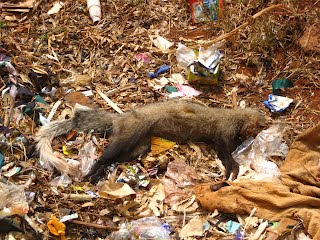This Terror's prey were chickens large and small, and any other animal that can be easily assassinated and inconspicuously carried off. Elusive and annoying, this Terror was a menace to all the chicken and rabbit keepers in the area who all wished dearly for its abrupt demise.
My neighbor's bitch had recently given birth to four puppies. Although she was a grainy yellow, each puppy she birthed had its own unique color: solid brown and white, smokey black, Oreo cookie, and a blended brownish black. The children on the compound took special interest in each puppy, naming the one they each liked best, and secretly playing with them when my neighbor was not looking (they say that if you play with puppies when they are small, they become worthless as watchdogs when they get older).

The puppies were nearly two weeks old. Their eyes had only just fully opened and they were learning to walk. At times we would just stand and watch as they awkwardly took each step and then paused, bow-legged, with their cute faces searching around for approval.
On one fateful Saturday, the children were playing outside when they heard an unusual wail from the puppies, followed by desperate and incessant yelping sounds. The children and the housekeeper ran to investigate the commotion to find The Terror with the smallest puppy in his mouth trying to escape, but obviously encumbered by the weight of its prey. The children screamed. Instantly the housekeeper surveyed the ground, grabbed the biggest stone in proximity and hurled the projectile at The Terror. With a great thud, the stone made impact, knocking the puppy free and disorienting the Terror. The children did not stand idle, they grabbed their own weapons and began hurling, beating, and abusing the Terror until the housekeeper came by with a larger rock, and loosed it on the head of the beast, killing it instantly.
The children rushed to the puppies, to find that all of them had been injured by The Terror, but that they were thankfully all still alive. The puppy being carried by The Terror was in the worst shape; blood trickled from his neck down his foreleg, and open gashes splayed across his belly. After checking that the puppies were alright, they ran to the carcass of The Terror.

“Let's roast it,” one child said after they spent minutes staring at the dead animal. So they got to work placing sticks and dry grass under the carcass and then setting fire to the dead beast. The children all huddled around, the younger ones screaming in delight at the sight of the open fire while the others watched intently as The Terror's hair burned away and the skin began to bubble and melt. After half an hour, The Terror was well-cooked, and so they carried the roasted meat to the mother and the four puppies.

“Eat.” The children commanded the dogs, as they laid the meat in front of them. “Eat, so that you heal quickly!” The children felt it was only fair that the bitch and her puppies were fed the meat of their attacker. The dogs usually had vegetarian food, so this was actually a treat for them. Hungrily the mother ate her fill and breastfed her puppies.
The housekeeper glowed as neighbors lauded her for her great aim and triumph over The Terror. Finally, after months of poaching chickens and puppies, The Terror had been slain. Finally, due justice had been paid.
From hearing rumors of The Terror, I was suspecting a much more vicious, malicious, monstrous creature. But in the end The Terror simply turned out to be a mongoose. No wonder it wasn't afraid of snakes.
